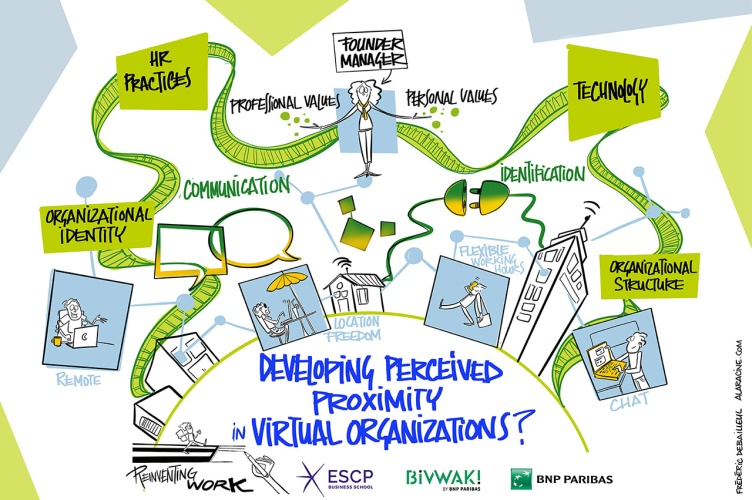Managing in geographically dispersed virtual organisationsA fascinating project launched in December 2020
Research context
In this qualitative research launched in December 2020, we study what glues employees with each other and with the employer in a geographically dispersed virtual organisation, where organization members have limited or zero face-to-face interactions.
The results are based on the analysis of primary data obtained from 24 in-depth interviews with the employees holding various management and non-management positions in two small-sized virtual organisations and secondary data in a form of text, photo and video documents obtained from social media blogs of the founders of these virtual organisations as well as from the internal corporate institute of one of these companies.
Research question
How is perceived proximity to organisation (to employer and other employees) developed in virtual organisations?
Methodology and milestones
In-depth interviews with virtual organisation founders and analysis of their social media blogs were administered and analysed in Q1 and Q2, 2021.
Further interviews and analysis of primary and secondary data were administered in Q4 of 2021, Q1 and Q2 of 2022.
New cases will be added in Q3 and Q4 2022, and final results delivered in 2023.
Research team
- Ekaterina Salovskaia-Leport (ESCP, Paris campus)
- Maral Muratbekova-Touron (ESCP, Paris campus)
Research keytake aways
Communication and identification among employees and with the organisational identity affect the perception of closeness of both geographically dispersed colleagues and the employer.
Communication and identification and their effect on perceived proximity are moderated by socio-organisational and individual factors. These factors include network density, technology, organisational structure, organizational identiy, human resource practices signalling employer branding, and employees’ desire to work remotely.
Through sharing their personal and professional values on social media networks managers influence employer branding message of the organisation.
HR practices signaling employer branding and organisational identity transmitted by managers form a solid ground for employee identification among each other and with organisation.
Attention points: Perceived proximity to organisation, organisational identity, employer branding.
12 Research projects from the Reinventing Work Chair
By bringing together academics and professionals, the Chair facilitates renewed theoretical and practical views of the following key topics:
- Reshaping the work experience
- The role of agility to organise and change work
- Measuring the paradox of flexible working
- Psychological contract and new work relationships
- HR & digitalisation
- Talent sharing as a new development tool
- Technology-enabled interviews
- Shifts in expertise in the data science era
- Managing in geographically dispersed virtual organisations
- Virtual teams and well-being
- Meaning of work and self organisation
- New contact centres & hybrid work (coming soon)
Key outcomes
External ecosystem
Shared research outputs / Awards and articles
"Developing perceived proximity to employer in virtual organisations”, Research master thesis, October 2021
“Developing perceived proximity in virtual organisations”, 2022 Fifth Global Conference on International Human Resource Management, May 2022 [link ]
Campus
